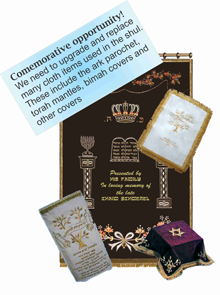From the time a child is born parents have an obligation to educate their children to observe the mitzvoth (commandments) of the Torah.
It is customary that when a girl is born, her father receives and Aliyah and a special prayer is said, giving the child her official name. In this prayer, we ask G-d to assist the parents in bringing up their daughter with Torah values.
Tradition teaches us that when a girl turns twelve, she is now fully responsible for her own actions. Now that she is an “adult” in Jewish law, she also receives all the rewards for her observance of mitzvoth.
At the age of 12, we clearly see our little girls emerging as young women. These young women no longer live in the fantast world of childhood and can begin to make their own choices on their direction in the world. They develop an enhanced moral awareness and sensitivity. They are able to take responsibility for their actions. According to Jewish tradition, these young women are ready to channel their energy to good. They are ready to overcome their childhood tendency to put their own needs above those of others.
On a deeper level, just as their bodies are growing and changing, so too are their souls. The Kabbaliststc tradition tells us that a person’s spiritual being has several levels of soul. A new level of soul, called neshamah, comes into awareness at bat mitzvah time. This level is what gives a person the ability to make conscious, rational decisions.
It has become a widespread tradition to celebrate this event in shul.
“The Batmitzvah Year”
I feel very strongly that the “Batmitzvah Year” should be put to good use. It is not sufficient to prepare for the Batmitzvah ceremony. Preparing for Batmitzvah in our shul involves much, much more. The girls attend a shiur given by Rabbi Rabinowitz for an hour once a week. In addition to this, the girls are encouraged to attend shul every Shabbat. On Shabbat morning a special session will take place for the girls. There are also programs for the mothers and their daughters which are held during the year. All of the above should help create a wonderful year leading up to the Batmitzvah.
Procedure for booking a Batmitzavah
Parents wishing to have their daughter’s Batmitzvah at the Shul should contact the Rabbi to set up an appointment at which time the programme and all other matters pertaining to the Batmitzvah will be discussed.
Please take note of the following guidelines and code of conduct which will assist in making your Simcha more meaningful:
Procedures in respect of honours such as an Aliyah on Shabbat morning
Approximately six weeks before the Barmitzvah, the Rabbi will meet with you and discuss procedures on the day and any queries you may have pertaining to the list of honours and who may or may not be called up for an Aliyah or Pesicha. A list will be given to you for completion which requires the English and Hebrew names of those you wish to honour.
Attendance for Shabbat services on Friday night and Saturday Morning
Please ensure that you and your guests are familiar with the starting times for Shabbat services on Friday night and Shacharit on Shabbat morning. It is important that those family members and guests who are receiving an Aliyah or a Pesicha are in Shul well before the time on the day as this creates a lot of stress for the family who are hosting the Simcha.
Dress code
The appropriate dress for your Simcha is a jacket and tie or smart casual. Guests are also required to dress appropriately for the occasion. Women should not wear pants to Shul. Men, women and children should dress modestly for the occasion.
General conduct in Shul during the service
Members and their guests are requested to refrain from talking during the service, particularly when the Aron Kodesh (ark) is opened or when the Torah is being read as well as during the Amidah and Shema prayers.
Talking across the Mechitzsa (which divides men and women) is also forbidden during the service.
Members and their guests are also requested to ensure that their children do not run around the Shul and make a noise during the services. Children are encouraged to attend the children’s service where they will learn and have fun.
Persons given an Aliyah or a Pesicha (to open the Ark) should proceed after the honour to shake hands with the Gaboyim sitting in front of the Bimah. The person receiving the honour is wished Yesher Koach meaning “may your strength grow”.







